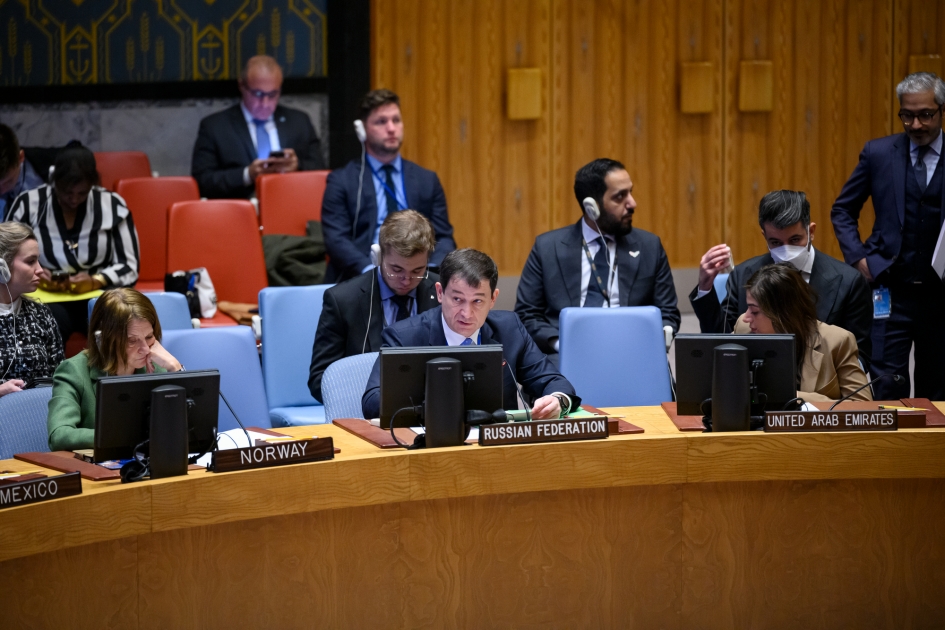Statement by First Deputy Permanent Representative Dmitry Polyanskiy at UNSC briefing on the situation in Libya
Mme.President,
We thank Special Representative of the Secretary-General and Head of the UN Support Mission in Libya A.Bathily, and you as Chair of UNSC Committee 1970 for their briefings.
We continue to pay close attention to the developments in Libya. Having relapsed in a duality of power, Libya is once again balancing on the verge of an armed conflict. We cannot rule out a possible escalation in foreseeable future. The leading political forces are mobilizing their adherers and trying to gain some additional support from the outside, while promising to the external stakeholders that their interests in Libya will be observed once the opponents in this struggle for power are defeated. This is hardly the path that ordinary Libyans deserve given the fact that their country has remained in a state of chaos and uncertainty since 2011.
Mme.President,
In order to overcome this impasse, Libya needs to agree on a draft Constitution and convene nation-wide inclusive elections. Engagement of the whole range of Libya’s leading political forces, including representatives of former authorities, is a cornerstone of national reconciliation. We welcome the efforts of the African Union to organize an all-Libyan conference to that end.
However, there is still a long way to go before the situation can be fully resolved. We regret to say it, but there is no essential progress at the political track. Intensive consultations of the leadership of the House of Representatives (HoR) and the High Council of State (HCS) have yielded no breakthrough results so far. They only discussed plans for distributing high-ranking positions in executive bodies and proclaimed a reciprocal commitment to holding a people’s vote as soon as possible. However, prospects for implementation of concrete steps to draft a constitutional framework and prospects for a national vote become even more elusive at this time given the fact that HoR and HCS put on hold their contacts due to disagreements that broke out in early December. It seems that the Libyan politicians themselves do not have too much interest in searching for a compromise, which is regrettable.
The role of the United Nations is demanded today as never before. We trust that UNSMIL will boost its activities as an impartial and neutral mediator for promotion of the political process in Libya. Taking the Libyan settlement outside of the UNSC-elaborated framework would be a wrong thing to do. We once again express our support for the Special Representative. SRSG Bathily, we do hope that your efforts to revive the Libyan settlement at all tracks will be successful. We are ready to engage closely and host a targeted exchange of opinions on the situation in Libya with you.
Given the current trends in Libya, engagement at the military track is key. We have taken note of the agreements made earlier in December under SRSG’s mediation to convene a session of 5+5 Joint Military Commission in January 2023 in Sirte. We call on the sides to deliver on their respective obligations under the Ceasefire Agreement and to stop delaying unification of the armed forces, especially in light of the fact that both eastern and western Libya demonstrate a constructive approach to this matter. Any occasional incident or plotted provocation may trigger violence and lead to disastrous military consequences.
In this context, the issue of foreign military presence in Libya remains crucial. We consistently advocate for a synchronized, well-balanced, systematic and step-by-step withdrawal of all non-Libyan armed groups and military units.
Mme.President,
We do have understand for the fact that Libyans strive to ensure stable exports of hydrocarbons, which is critical for Libya’s economic recovery. We underscore that proceeds from oil sales must be distributed in a fair and transparent manner. Otherwise the people of Libya risk falling victim once again to Western states who are ready to forgo a comprehensive and lasting Libyan settlement for the sake of their own geopolitical and commercial interests.
Libyan assets that were frozen by relevant UNSC sanctions should also remain in spotlight. International restrictions must help the political process and recovery of stability while keeping the Libyan money safe rather than help Western stares profiteer from it. It is unacceptable for financial mechanisms from third countries to thrive on the Libyan assets, which must be preserved for future generations of Libyans. We will continue to follow this aspect, i.a. in the context of UNSC Sanctions Committee 1970.
Thank you.
